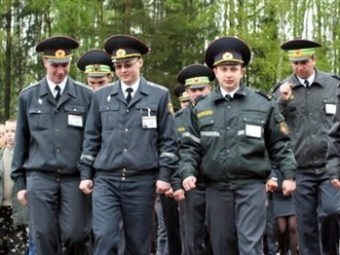Viasna’s lawyers on new “creative idea” by police
For quite a long time
now, the harassment of activists of pro-democratic public organizations through
charging them with an administrative offence has been to human rights defenders
some kind of a "standard": people keep being taken to courts almost
every day. Of
especially concern to the human rights defenders is the traditional sentencing
of activists and participants of peaceful rallies on charges of "petty
hooliganism" (Art. 17.1 of the Administrative Code). This
practice began to be actively used in 2006, when thousands of people, within a
short period of time, were arrested on trumped-up charges: they were accused of
"swearing" and "urinating in a public place." The
practice continued until the end of 2008, stopped for a while during so called
"liberalization" and stepped back from the beginning of 2011. Over
the past year and a half, more than 200 pro-active people have experienced the
"fairness" of trials on the charges.
The
problem of trumped up police reports (under Article 17.1 of
the Administrative Code) reveals a number of procedural nuances in modern
litigation. But
the main thing about the trials that has always been of interest to human
rights defenders and lawyers is the courts’ presumption of trust to police
officers in their evidence and the total absence of "victims"
(ordinary citizens whose peace was disturbed by so-called "hooliganism").
Of
course, all the comments were ignored by the courts, acquittals were rare (6 over
the last year), but suddenly two recent administrative trials surprised with their
innovation – in addition to police witnesses, there appeared new "witnesses":
the unemployed, who confirmed the facts of “disorderly conduct”.
In
particular, on August 22, 2012 Minsk police detained deputy chairman of the "Young
Front" movement Mikalai Dzemidzenka, who faced standard “hooliganism” charges.
The
following day, at a trial in the Court of Frunzenski District of Minsk, apart
from police witnesses Zharski and Azhyhau, the Judge listened to a witness named
Barys Rykau, unemployed, born in 1960. He had been questioned
by police officer M. Dubouski. The
minutes of the interview, and later in court, the witness testified that he was
waiting for the bus home, and at about that time, he “heard some guy of about
25 years old speaking loudly and swearing at people who were standing at the
bus stop, and then I
saw that he was approached by two young men in civilian clothes, who asked not
to use foul language but behave decently, to which he replied, swearing, and
sent them away, having pushed them.” “As
I realized later, it were the policemen, as they presented themselves to him
and showed identification, but in response, he reiterated his swearing. I
was approached by one of the officers, who asked if I had heard the swearing,
to which I said yes, and then I named myself. Then they
asked me to come with them to the police station,” says Barys Rykau. One has
only to note that when interviewed in court to all the additional questions the
witness replied "I do not remember."
A
similar situation occurred in the Court of Kastrychnitski District of Minsk on
August 31, 2012 during the trial of an activist of social networking communities
Pavel Yeutsikhiyeu, when, the testimony of witness Dzmitry Barabanau, born in
1982, was announced. According to the witness, he “was already in a room in Kastrychnitski
district police station, when Pavel came in and began to swear at everyone.” However,
it is not clear how the "witness" appeared in the police department,
and why he was not questioned in court.
Objectively,
the fact of an administrative offense involving a violation of public order usual
needs to be substantiated by witnesses from among ordinary citizens (other than
police officers, for when it is only them who are abused, that's a different part
of the administrative offense, but with the same sanctions). The
appearance of "ordinary" witnesses in such trials can be noted as a
positive and fair thing. However,
one should not forget that the use of trumped-up reports may result in their criminal
prosecution, while such witnesses as Rykau and Barabanau may well, except
administrative liability for false testimony, be charged with complicity to a
criminal offense.
One
has to add that the human rights defenders recently appealed to the Prosecutor
General and the Chairman of the Supreme Court with a statement on the issue of
preventive detentions of civil activists, members of youth opposition groups,
as well as on their judicial harassment. Representatives
of a number of human rights organizations asked for a meeting to discuss the
situation with illegal preventive detentions to demand to put an end to this
illegal practice and bring the perpetrators to justice. However,
the Prosecutor General's Office evaded
the human rights defenders’ proposals, as it sees no problem in the matter.


















